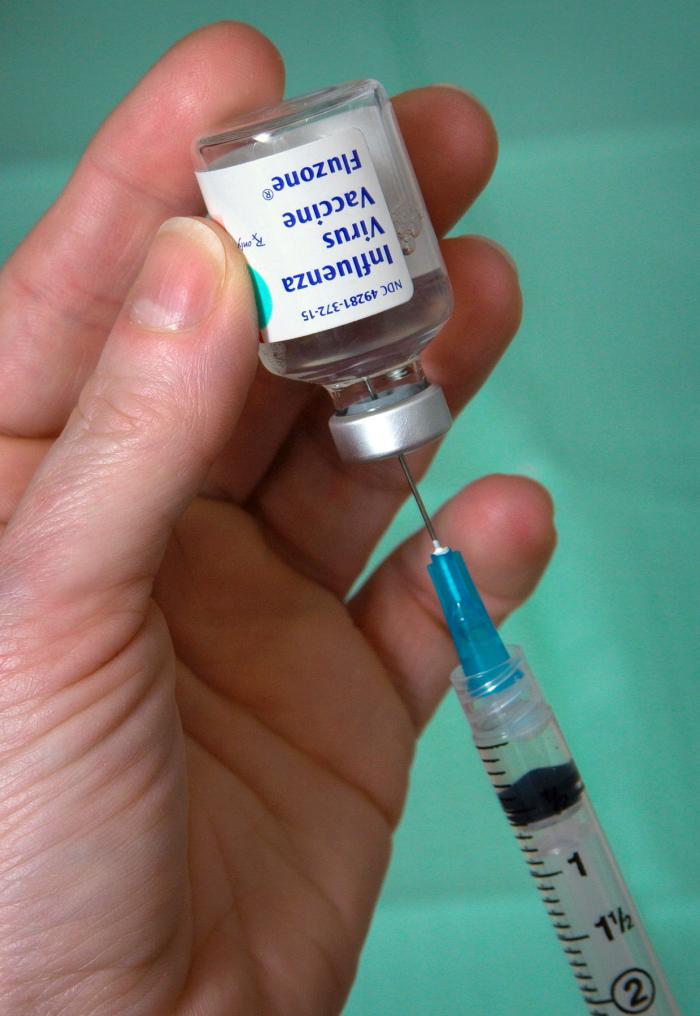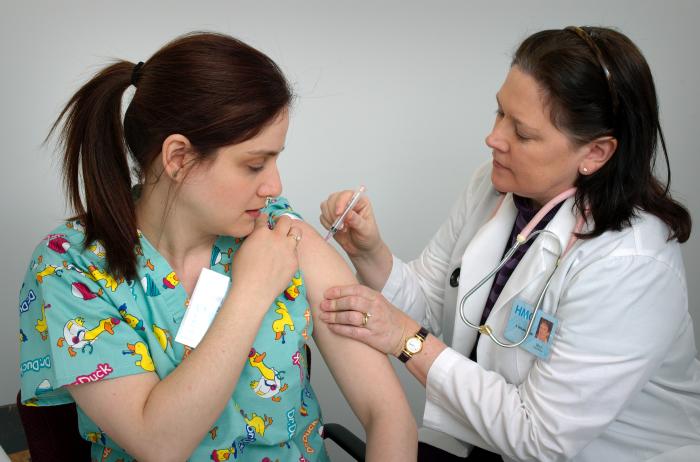Vaccines play an essential role in preventive care. Keeping current on your immunizations is the best way to protect yourself and your family from certain diseases. Vaccines help your immune system fight off illnesses caused by bacteria or viruses to prevent you from becoming ill.
At River Bend Medical Associates, we provide all the preventive services you need to help your whole family stay healthy including immunizations for infants, children, and adults of all ages.
We can vaccinate you and your whole family. Schedule your immunizations today.

Why Vaccines are Important
Vaccines have significantly reduced diseases that once commonly harmed or killed infants, kids, and adults. However, people all over the world, including the U.S., still suffer from serious illnesses or even die from diseases that immunization could prevent.
Vaccines can protect you and your family from catching several serious diseases and prevent you from getting sick. They also play a vital role in community health, as vaccines are the key to preventing disease among the general population.
Immunizations benefit the people who get them and the defenseless, unvaccinated people around them because the contagion can no longer spread.
Vaccinations also reduce the number of deaths and disability from infections, such as whooping cough and chicken pox. According to the CDC –Center for Disease Control, each year 4 million deaths are prevented worldwide by childhood vaccination against preventable diseases.
Vaccines are Safe
Vaccines have saved lives for over 100 years, but serious disease is still a threat – CDC. Vaccines are safe. Extensive lab testing and clinical studies are done on new vaccines before they are licensed and available to the public. Even after a vaccine is released, the CDC, FDA (Federal Food & Drug Administration), NIH (National Institutes of Health), and other government agencies continue to monitor and investigate any safety concerns.
Different vaccines work in various ways, but all vaccines help your body’s immune system learn how to fight germs. It usually takes a few weeks for protection to develop after immunization, but that protection can last a lifetime.
Vaccines can produce side effects, but most people experience only mild side effects, or none, after receiving a vaccine. The most common side effects are fatigue, fever, body aches, or swelling, redness, and tenderness at the injection site. These mild side effects usually go away on their own within a few days. Serious or long-term side effects are extremely rare, and vaccine safety is continually monitored.
Our family medical practice follows the CDC (Center for Disease Control) immunization schedule recommendations to ensure you and your family receive the appropriate vaccines throughout your lifetime. If your questions or concerns about vaccines are not answered here, please feel free to discuss with one of our physicians or a member of our healthcare team.
Immunization is important at all ages but is absolutely essential for people at higher risk, older adults such as older adults, babies, and young children.
Immunizations for Babies 0-2
Immunizations help give babies a healthy start by helping to provide immunity before kids are exposed to potentially life-threatening diseases.
Childhood vaccines protect against 14 serious diseases by the age of two including:
- DTaP – Diphtheria, Tetanus, Pertussis (whooping cough)
- Varicella (chicken pox)
- Polio
- MMR – Measles, Mumps, Rubella
- Haemophilus influenzae type b (Hib)
- Hepatitis A
- Hepatitis B
- Inactivated poliovirus
- Respiratory syncytial virus
- Pneumococcal disease
- Influenza
- Rotavirus
Vaccines are tested to certify that they are effective and safe for babies and children to receive at the recommended ages. Booster shots may be necessary for some vaccines to build and boost immunity.

Immunizations for Children 3-10
When children are unvaccinated, they are not only at increased risk for catching diseases, they are also at risk for spreading illness to others in their daycare, playgroups, classrooms, and communities.
Your child will need booster shots of some vaccines from ages 3 – 6.
Talk to your child’s family doctor to find out if they are up to date with all the vaccinations recommended for their age group.
- Flu – Because flu viruses are constantly evolving and the body’s immune response declines over time, everyone over the age of 6 months should get a flu shot every year.
- DTaP – Diphtheria, Tetanus, Pertussis (whooping cough)
- Varicella (chicken pox)
- Inactivated poliovirus
- MMR – Measles, Mumps, Rubella
- Varicella (chicken pox)
You may need a certificate of immunization to enroll your child in school. Talk to your family doctor about your child’s vaccination schedule and immunization record.
Download the CDC’s current recommended schedule of vaccines for children 0-6years old: English Spanish (PDF)
See more information on CDC’s Vaccination Recommendations for your Children.
Immunizations for Teens and pre-teens 11-18
As they become adolescence, kids are at greater risk for meningococcal disease and infections that can lead to HPV-related cancers. In addition, some childhood vaccinations wear off over time, so pre-teens and teens may need additional doses of certain vaccines to stay protected from serious diseases like diphtheria, tetanus, and pertussis.
Parents should talk to their primary care provider to be sure their teen’s vaccinations are up-to-date. Vaccinations and booster shots recommended for teens and pre-teens include:
- Influenza – The CDC recommends that everyone 6 months and older should get a flu vaccine every year, ideally by the end of October
- Meningococcal disease vaccines (MenB & MenACWY)
- Tdap – tetanus, diphtheria & pertussis booster
- HPV – The CDC recommends that all pre-teens get an HPV vaccination to protect them from Human Papillomavirus (HPV) infections that can cause cancer later in life. 11- to 12-year-olds receive two doses of the human papillomavirus vaccine 6-12 months apart.
Getting routine vaccinations is one of the safest and easiest ways to protect your teen from viral invaders.
Download the CDC’s current recommended vaccination schedule for children 7 – 18 years: English Spanish
Make sure your family is up-to-date on their immunizations, call River Bend Medical Associates for an appointment today: 916-392-4000
Immunizations for Adults 19-49
For adults, getting routine immunizations is one of the safest ways to protect their health and the health of their whole family.

Vaccination helps prevent catching and spreading illnesses that could result in poor health, medical bills, missed work, and not being able to care for your family.
It’s a good idea to talk to your primary care physician to make sure you are current with all the recommended vaccinations for your age group including flu, Covid-19, Varicella (chicken pox), Hepatitis, MMR (measles, mumps, rubella), and Tdap (tetanus, diphtheria & pertussis booster).
Some adults may need other vaccines due to travel, employment, lifestyle, or health conditions. Your family doctor can help you keep track of your immunization history and the recommended vaccines you need.
Download the CDCs current adult vaccination recommendations in English (PDF) or Spanish (PDF)
Immunizations for Older Adults 50+
As we grow older, we are at a higher risk for developing complications from infections like influenza, pneumonia, or varicella zoster(shingles). This is especially true for those with other underlying health conditions such as heart disease, lung conditions, or diabetes.
Vaccinations are an important element of preventive care for our older patients. To help you maintain good health and an active lifestyle, at River Bend Medical Associates, we recommend staying up-to-date on your immunizations.
Talk to your doctor to learn which vaccines are recommended for you based on your age and other factors.
Vaccinations recommended for people over 50 include:
- Influenza (Flu) – every year in the fall
- Covid-19
- Shingrix – Given in two doses to prevent shingles (varicella zoster) and related complications.
- TD – for protection against tetanus (every ten years) or
- Tdap – tetanus, diphtheria & pertussis (this vaccine is given instead of TD)
- Pneumococcal vaccine – For people over 65, pneumonia can be serious and life-threatening, especially for those who have underlying health issues like COPD or diabetes. PCV20 or PCV15 are vaccines to prevent pneumococcal disease, a severe bacterial infection, that may affect your lungs, blood, and brain.
Depending on your health conditions, you may need additional vaccines such as for Hepatitis B or RSV (respiratory syncytial virus). Talk to your physician about what shots are right for you.
Staying current with your vaccinations is important for all ages, but it is vital for older adults who are at a higher risk for developing serious and life-threatening complications from illnesses like the flu.
Multiple Vaccines in One Easy Visit. Schedule your shots today.
Travel Vaccinations
Traveling internationally increases your chances of catching and spreading diseases that are rare or not found in the United States. Find out which medications or travel vaccines you may need to help you stay healthy on your trip.
In addition to any required travel vaccinations you may need, before you travel abroad, it’s important to catch up on any routine vaccinations you may have missed. Routine vaccinations protect you from infectious diseases such as measles which can spread quickly in groups of unvaccinated people. Numerous diseases prevented by routine vaccines may not be common in the U.S. but are still common in other countries.
It is a good idea to make an appointment with your family doctor for a travel medicine consult at least six weeks to a month before your trip to help you prepare for possible health consequences of travel to specific parts of the world where health risks are different from those you may encounter when traveling within the continental United States. Your family doctor can help you with destination-specific vaccines, medications, and information.
The vaccinations and medications required or recommended for international travel depend on several factors including your age, health, and travel destinations.
Also, talk to your doctor about other vaccines you may need based on your lifestyle, travel habits, and other factors.
Discuss your health concerns and share the following information about yourself and your travel plans with your doctor:
- Health concerns or conditions like pregnancy, allergies, or chronic health problems.
- Travel destinations and itinerary.
- Type of travel (business, adventure, cruise)
- Where you are staying (hostels, hotels, short-term rentals)
- When you plan to depart and the length of your trip.
- Types of activities you are planning.
Be sure to plan ahead, and get your vaccines at least 4 to 6 weeks before your trip. Note: It may take time to prepare for your pre-travel medical appointment, you may need more than one dose of certain vaccines, and your body will need time to build immunity.
Latest CDC Travel Notices
You can visit the CDC Traveler’s Health Destinations page for more information about requirements and recommendations for the specific locations you will be visiting during your trip.
Where Shots are Required

Certain immunizations are necessary for school, work, travel, and more. Military personnel, students, and residents of care centers, or rehabilitation facilities must be vaccinated against diseases that circulate in close quarters. People who work in healthcare or other jobs that put them at risk for contracting and spreading preventable diseases also need to be immunized. And of course, shots are required before travel to many places around the world.
Regular immunizations are the best way to protect yourself, your family, and your community from certain preventable diseases.
Whether you need to catch up on your routine vaccinations, have health concerns, or it is just time for your annual visit, contact the caring professionals at River Bend Medical Associates for an appointment today!
At River Bend Medical Associates, our primary healthcare team of family doctors, PAs, NPs, nutritionists, and support staff are highly skilled and dedicated to the healthcare needs of your entire family. From routine exams to illnesses and injuries, we are here to provide comprehensive and continuous care for you and your loved ones.


